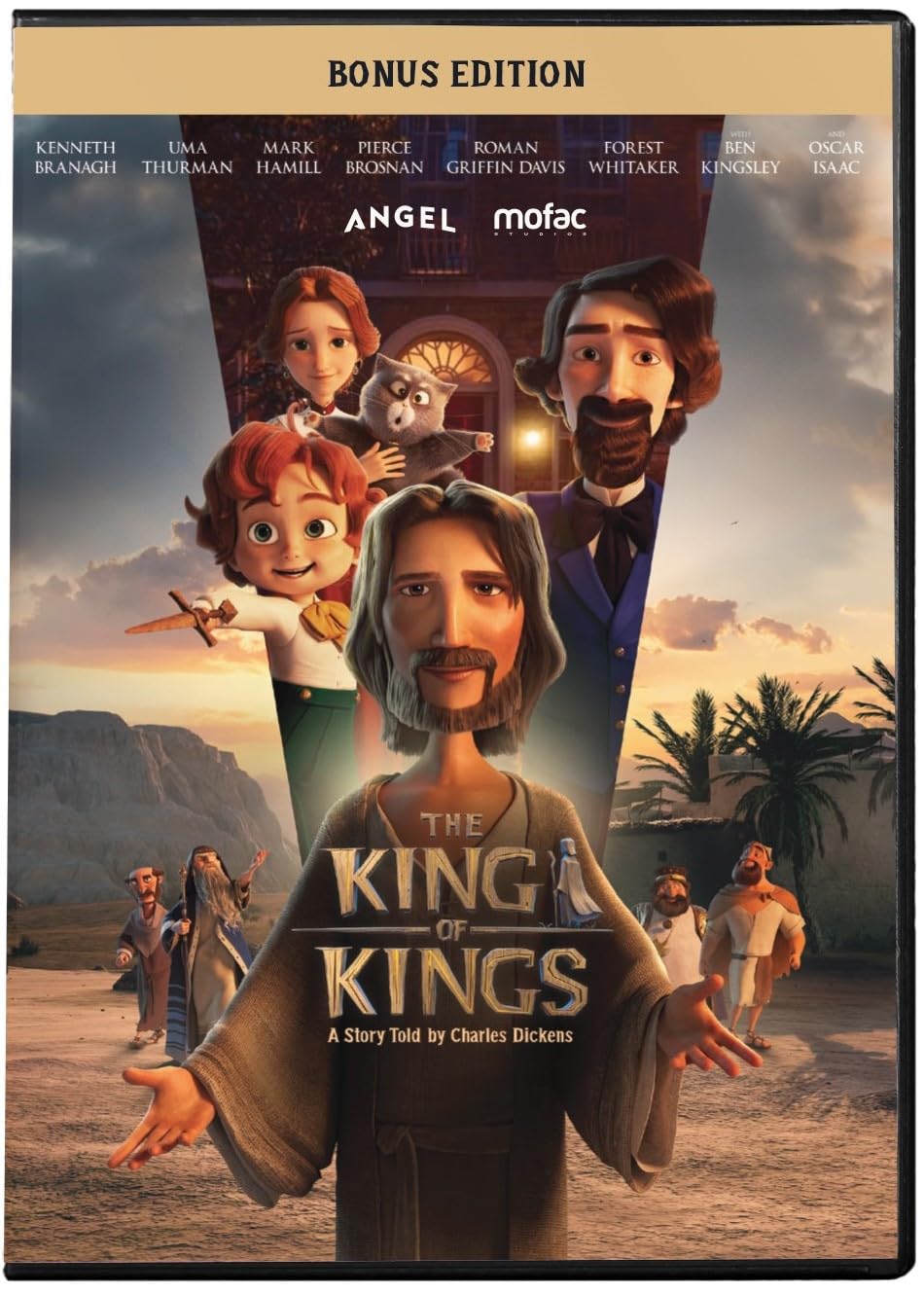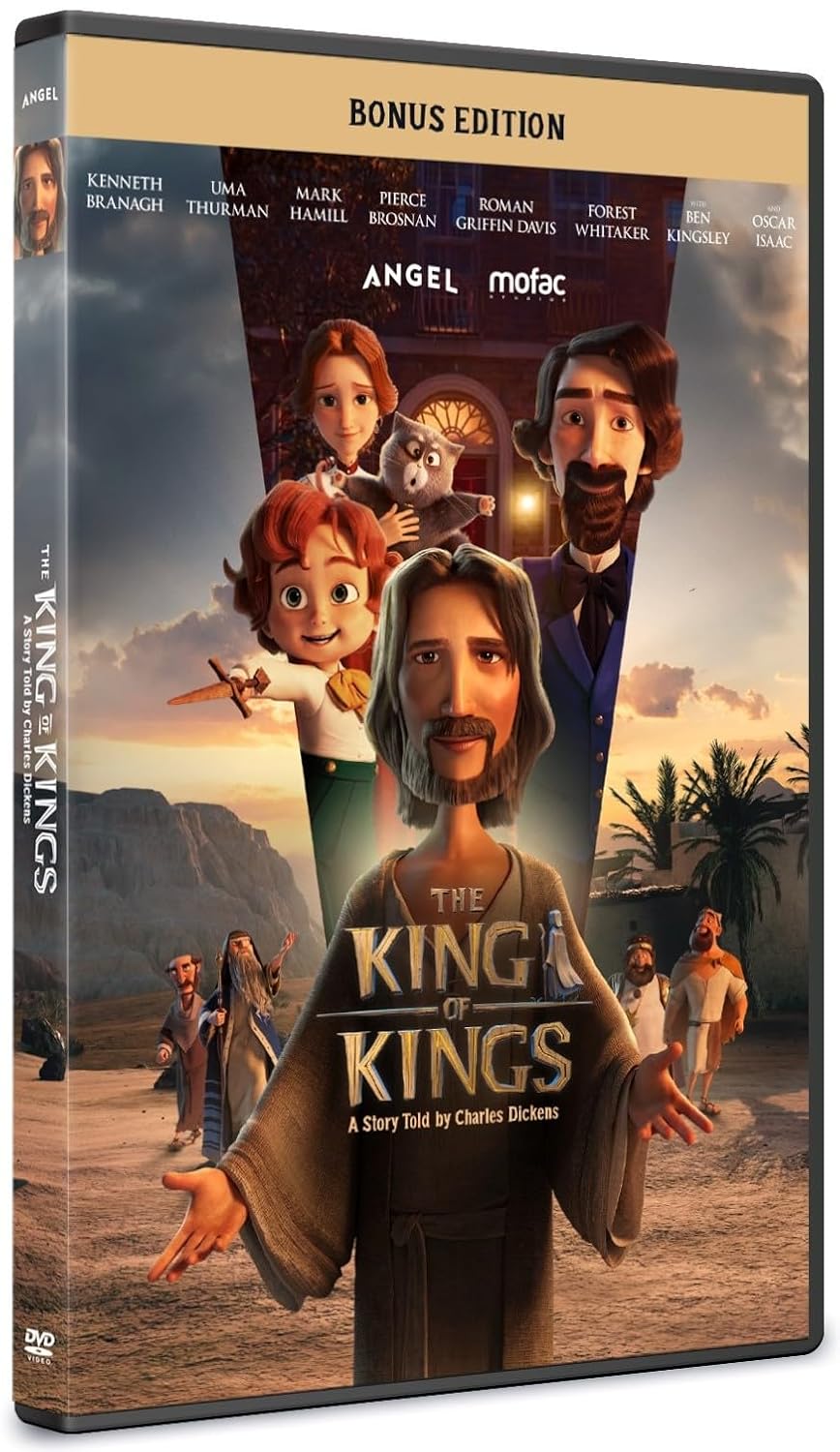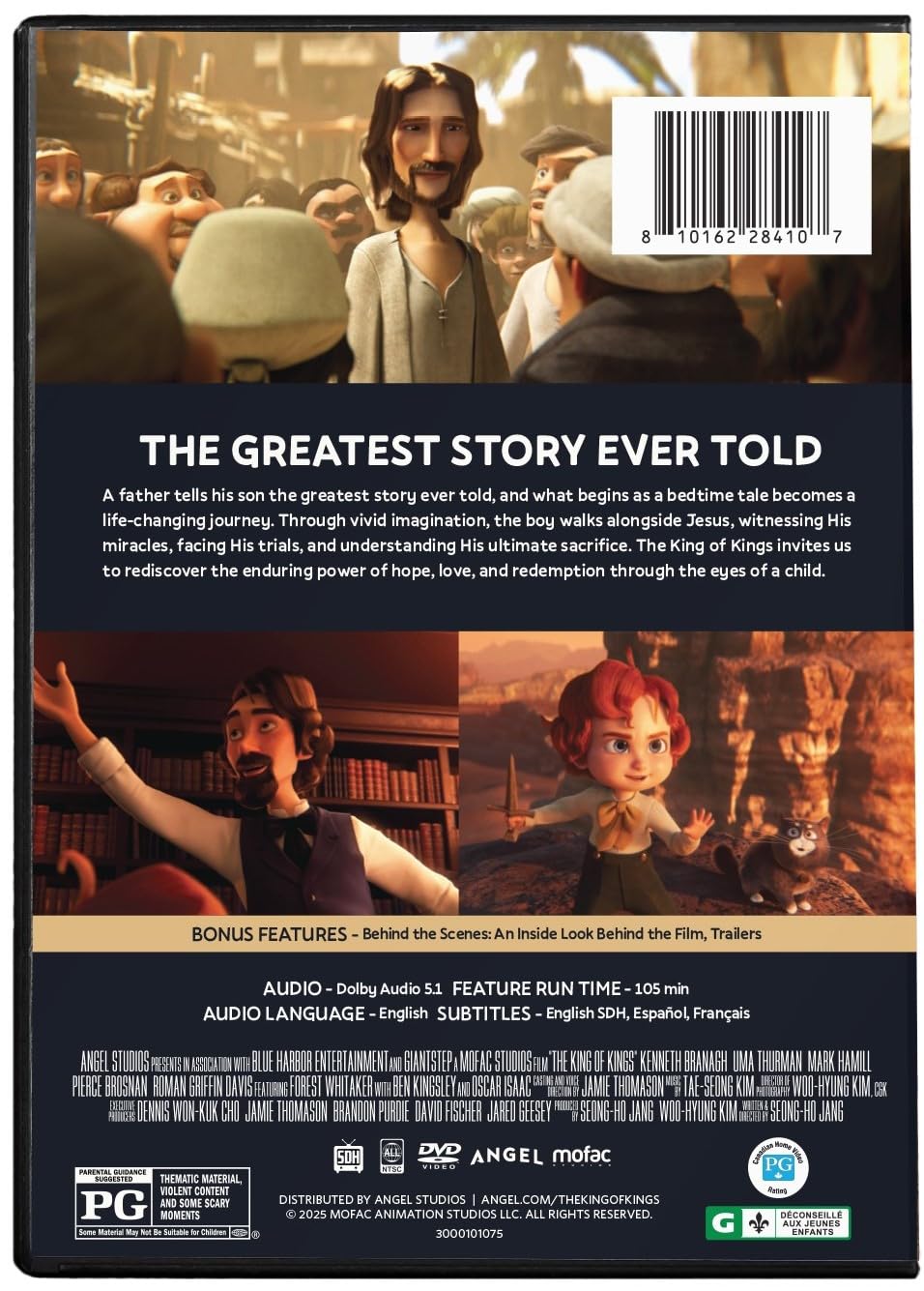
The King of Kings (DVD) Buying Guide king of kings Review
The King of Kings: A Cinematic Journey Worth Taking?
The story of Jesus Christ has been told countless times, in literature, art, and of course, film. Among the many cinematic interpretations, Nicholas Ray’s 1961 epic, *King of Kings*, holds a unique place. More than just a retelling of familiar biblical narratives, the film offers a sweeping vista of Roman-occupied Judea, filled with political intrigue, social unrest, and the emergence of a figure who would forever alter the course of history. Whether you’re a seasoned cinephile, a student of history, or simply looking for a powerful and visually stunning story, *King of Kings* deserves your consideration. But before you add this classic to your DVD collection, let’s delve into what makes it a compelling film and examine the various aspects to consider when purchasing it. We’ll look at the film’s historical context, its artistic merits, the technical aspects of the DVD release, and ultimately, help you decide if this cinematic portrayal of Jesus is right for you. So, let’s embark on this journey together, exploring the grandeur and nuances of *King of Kings*.
Unveiling the Epic Scope: Story and Historical Context
*King of Kings* isn’t just a biographical film; it’s a historical drama that attempts to capture the turbulent era in which Jesus lived. Understanding this context is crucial to appreciating the film’s scope and ambition. The movie paints a picture of Judea under Roman rule, a land simmering with discontent and longing for liberation. Pontius Pilate, played with chilling detachment by Hurd Hatfield, represents the cold, calculating power of the Roman Empire, struggling to maintain order in a volatile province. This depiction of Roman governance, with its underlying tensions and heavy-handed tactics, provides a backdrop against which the teachings and actions of Jesus gain even greater significance.
The film deviates from a purely religious narrative, focusing on the political undercurrents and the widespread social dissatisfaction. Characters like Barabbas, the rebel leader, highlight the different paths people chose in response to Roman oppression – armed resistance versus peaceful revolution. This adds depth to the story, presenting Jesus not just as a spiritual figure, but as a catalyst for change in a world ripe for upheaval. *King of Kings* attempts to humanize the figures of the New Testament, showcasing their internal conflicts and motivations. The portrayal of Judas, for example, is nuanced, hinting at a genuine desire to see Jesus succeed, rather than simply portraying him as a betrayer from the start. This complexity, while potentially controversial to some viewers, adds a layer of psychological depth that is often absent in more straightforward biblical adaptations. The film’s effort to provide a panoramic view of the era, incorporating both religious and political elements, is a key factor in its enduring appeal. Understanding this context is essential for appreciating the film’s vision, and will help viewers determine whether the *King of Kings DVD* is the right addition to their collection.
The Art of Adaptation: Directing, Acting, and Cinematography
Beyond its historical setting, *King of Kings* is a visually impressive film, thanks to its skilled direction, compelling performances, and stunning cinematography. Director Nicholas Ray, known for his rebellious spirit and visually arresting style, brings a unique perspective to the biblical narrative. He avoids excessive sentimentality, instead opting for a more grounded and realistic portrayal of the characters and events. This approach might not appeal to all viewers, but it lends the film a certain gravitas and authenticity. The cinematography, with its sweeping landscapes and carefully composed shots, is another major highlight. The film was shot in Spain, which provides a visually striking backdrop that effectively evokes the ancient landscapes of Judea. The use of color is also noteworthy, with the filmmakers employing a rich palette to create a sense of grandeur and spectacle.
Jeffrey Hunter’s portrayal of Jesus is perhaps the most debated aspect of the film. Some critics found him too conventionally handsome and lacking in the gravitas traditionally associated with the role. However, others argue that his youthfulness and approachable demeanor make him more relatable to modern audiences. Ultimately, Hunter’s performance is a matter of personal preference. The supporting cast is uniformly strong, with notable performances from Siobhan McKenna as Mary, Robert Ryan as John the Baptist, and Harry Guardino as Barabbas. Each actor brings depth and nuance to their respective roles, contributing to the film’s overall sense of realism. Consider how these performances influence your perception of the narrative. The film presents a memorable score by Miklós Rózsa, which heightens the emotional impact of key scenes. The music is both grand and intimate, effectively capturing the epic scale of the story while also underscoring the personal struggles of the characters. When seeking the best *King of Kings DVD* edition, be sure to check for audio quality and extras. The film’s artistic merits, including its directing, acting, and cinematography, contribute significantly to its enduring appeal.
Technical Specifications and DVD Features: Choosing the Right Edition
When purchasing *King of Kings* on DVD, it’s important to consider the technical specifications and available features. Different editions may offer varying levels of picture and sound quality, as well as additional content that enhances the viewing experience. Here’s a breakdown of some key aspects to look for:
* **Picture Quality:** Ideally, you should look for a DVD edition that has been remastered from the original film elements. This will result in a sharper, clearer picture with more vibrant colors. Pay attention to reviews that comment on the picture quality of different editions.
* **Sound Quality:** The DVD should offer a clear and balanced audio track that accurately reproduces the film’s original soundtrack. Look for editions that offer multiple audio options, such as Dolby Digital 5.1 or DTS.
* **Aspect Ratio:** The original aspect ratio of *King of Kings* is 2.35:1 (widescreen). Make sure the DVD preserves this aspect ratio to avoid distortion or cropping.
* **Subtitles:** If you prefer to watch movies with subtitles, ensure that the DVD offers subtitles in your preferred language(s).
* **Special Features:** Many DVD editions include bonus features such as behind-the-scenes documentaries, interviews with the cast and crew, trailers, and commentary tracks. These features can provide valuable insights into the making of the film and enhance your appreciation of it.
Here’s a table comparing some potential *King of Kings* DVD editions (hypothetical examples):
| Edition | Picture Quality | Sound Quality | Aspect Ratio | Special Features | Price (Approx.) |
|---|---|---|---|---|---|
| Standard Edition | Good | Dolby Digital 2.0 | 2.35:1 | Trailer | $9.99 |
| Remastered Edition | Excellent | Dolby Digital 5.1 | 2.35:1 | Behind-the-scenes documentary, trailer | $14.99 |
| Collector’s Edition | Excellent | DTS-HD Master Audio 5.1 | 2.35:1 | Behind-the-scenes documentary, interviews, commentary track, photo gallery, trailer | $24.99 |
By carefully considering these factors, you can choose the *King of Kings* DVD edition that best suits your needs and preferences. A quality edition will greatly enhance your viewing experience, bringing the epic story to life in all its glory.
Analyzing the Narrative: Strengths and Weaknesses
While *King of Kings* is a visually impressive and historically ambitious film, it’s not without its shortcomings. Like any adaptation of a complex and widely interpreted story, it faces the challenge of balancing faithfulness to the source material with cinematic storytelling conventions. One of the main criticisms leveled against the film is its perceived lack of emotional depth. Some viewers find the characters to be somewhat underdeveloped, and the emotional impact of key events to be muted. This may be due to the film’s attempt to maintain a certain level of objectivity, avoiding excessive sentimentality or melodrama. However, this approach can also leave some viewers feeling emotionally detached from the story.
Another point of contention is the film’s portrayal of Jesus himself. As mentioned earlier, Jeffrey Hunter’s performance has been criticized for being too conventional and lacking in spiritual gravitas. Some viewers find it difficult to connect with his portrayal of Jesus, which can detract from the film’s overall impact. The film’s attempt to provide a broader historical context, while commendable, can also feel somewhat distracting at times. The focus on political intrigue and social unrest can overshadow the core religious message of the story. Additionally, some of the historical details presented in the film may not be entirely accurate, which can be problematic for viewers seeking a strictly faithful adaptation. Despite these weaknesses, *King of Kings* remains a valuable cinematic experience. Its visual grandeur, historical scope, and compelling performances make it a worthwhile watch for anyone interested in the story of Jesus Christ and the world in which he lived.
The question remains whether the historical context ultimately enriches or detracts from the story. Some viewers appreciate the added layer of political and social complexity, while others find it unnecessary or even distracting. Ultimately, the effectiveness of this approach depends on the viewer’s individual preferences and expectations. Considering both the strengths and weaknesses of *King of Kings* is crucial when deciding whether to purchase the *King of Kings DVD*.
Beyond the Screen: Legacy and Cultural Impact
*King of Kings*, despite its mixed critical reception upon release, has endured as a significant film in cinematic history. Its legacy extends beyond mere entertainment, influencing subsequent biblical epics and shaping the way audiences perceive the story of Jesus Christ. One of the key aspects of its lasting impact is its visual style. The film’s sweeping landscapes, grand sets, and meticulously designed costumes set a new standard for biblical epics. Its visual aesthetic has been imitated in countless other films and television shows, solidifying its place as a landmark in cinematic design. *King of Kings* also played a role in shaping public perception of Jesus Christ. While Jeffrey Hunter’s portrayal may have been controversial, it also presented a more human and relatable image of Jesus to a wider audience. This contributed to a shift away from the more traditional, overtly reverential depictions of Jesus in earlier films. The film also sparked debate and discussion about the historical accuracy of biblical narratives. Its attempt to provide a broader historical context, while not always entirely accurate, encouraged viewers to think critically about the historical setting in which Jesus lived.
Moreover, the film’s global reach has contributed to its enduring legacy. Translated into numerous languages and distributed worldwide, *King of Kings* has introduced the story of Jesus Christ to audiences in cultures and regions where it may not have been widely known before. The film’s influence can be seen in countless art forms, from painting to literature. It has inspired artists and writers to create their own interpretations of the story of Jesus Christ, further expanding its reach and impact. Whether viewed as a religious text or a historical drama, *King of Kings* remains a powerful and thought-provoking film that continues to resonate with audiences today. The cultural impact also influences people’s opinions of the various *King of Kings DVD* releases. Its impact on film and art is a major selling point.
FAQ
What is *King of Kings* about?
*King of Kings* is a 1961 American epic film directed by Nicholas Ray that tells the story of Jesus Christ from his birth to his crucifixion and resurrection. However, it also provides a broader historical context of Judea under Roman rule, focusing on the political and social unrest of the time. The film attempts to portray Jesus not only as a religious figure but also as a catalyst for change in a world ripe for revolution. It explores the tensions between the Roman authorities and the Jewish people, showcasing the different paths people chose in response to Roman oppression, from armed resistance to peaceful revolution. The movie weaves together familiar biblical narratives with historical events, creating a sweeping and visually stunning depiction of the life and times of Jesus.
Is *King of Kings* historically accurate?
While *King of Kings* strives to depict the historical context of Judea under Roman rule, it’s important to remember that it is a cinematic adaptation of a religious text and not a documentary. The film takes certain liberties with historical details and interpretations to enhance the storytelling and create dramatic effect. Some historians have criticized the film for inaccuracies in its portrayal of certain events and characters. Additionally, the film’s depiction of Roman governance and the social dynamics of the time may not be entirely consistent with historical evidence. It’s always a good idea to cross-reference the film with other historical sources to gain a more complete and accurate understanding of the period. Keep in mind that *King of Kings* is ultimately a work of fiction inspired by historical events, not a strict historical record.
How does Jeffrey Hunter’s portrayal of Jesus compare to other actors who have played the role?
Jeffrey Hunter’s portrayal of Jesus in *King of Kings* has been a subject of much debate and discussion. Some critics have found his performance to be too conventionally handsome and lacking in the spiritual gravitas typically associated with the role. They argue that he doesn’t convey the sense of divine authority or otherworldly presence that other actors, such as Max von Sydow in *The Greatest Story Ever Told*, have brought to the role. However, others argue that Hunter’s youthfulness and approachable demeanor make him more relatable to modern audiences. They see his portrayal as a more human and accessible interpretation of Jesus, one that emphasizes his compassion and empathy. Ultimately, the effectiveness of Hunter’s performance is a matter of personal preference.
Is there anything to consider about the portrayal of violence in the film?
*King of Kings*, like many biblical epics, does depict scenes of violence, particularly during the crucifixion sequence. While the film doesn’t dwell on gratuitous or excessive violence, it does show the brutality of Roman punishment and the suffering of Jesus. Viewers who are sensitive to violence should be aware of this before watching the film. The level of violence is generally consistent with other films of its era, but it’s still important to be prepared for it.
What are the key special features to look for when buying the *King of Kings DVD*?
When purchasing *King of Kings* on DVD, the special features can significantly enhance your viewing experience. Some key features to look for include:
* **Behind-the-scenes documentaries:** These provide insights into the making of the film, featuring interviews with the cast and crew, footage from the set, and discussions about the challenges of adapting the biblical story.
* **Commentary tracks:** These offer an in-depth analysis of the film by film historians, directors, or actors, providing valuable context and insights into the film’s themes, production, and historical background.
* **Deleted scenes:** These offer a glimpse into scenes that were cut from the final film, providing additional context and character development.
* **Trailers and promotional materials:** These offer a glimpse into the film’s original marketing campaign and how it was received by audiences at the time.
* **Photo galleries:** These showcase still images from the film, including behind-the-scenes shots and publicity stills.
Is *King of Kings* suitable for children?
Whether *King of Kings* is suitable for children depends on their age, maturity level, and individual sensitivities. The film contains scenes of violence, including the crucifixion, which may be disturbing for some children. Additionally, the film deals with complex religious and historical themes that may be difficult for younger children to understand. Parents should preview the film before showing it to their children and be prepared to discuss the content with them. Some parents may choose to wait until their children are older and more mature before showing them the film. Other families may find it appropriate for older children who have a strong interest in biblical stories or historical dramas.
Are there any alternative adaptations of the life of Jesus that are worth considering?
Yes, there are many other adaptations of the life of Jesus that are worth considering, each offering a unique perspective and approach to the story. Some notable examples include:
* ***The Gospel According to St. Matthew* (1964):** A neorealist Italian film directed by Pier Paolo Pasolini, known for its stark and authentic portrayal of Jesus and his teachings.
* ***Jesus of Nazareth* (1977):** A British-Italian miniseries directed by Franco Zeffirelli, widely praised for its respectful and reverent depiction of Jesus, played by Robert Powell.
* ***The Last Temptation of Christ* (1988):** A controversial film directed by Martin Scorsese, exploring the internal struggles and temptations of Jesus.
* ***The Passion of the Christ* (2004):** A graphic and controversial film directed by Mel Gibson, focusing on the final hours of Jesus’ life.
* ***The Chosen* (2017-present):** A television series that explores the life of Jesus through the eyes of those who knew him.
Each of these adaptations offers a different take on the story of Jesus, and viewers may find that some resonate with them more than others. Exploring these alternative adaptations can provide a richer and more nuanced understanding of the life and teachings of Jesus.











